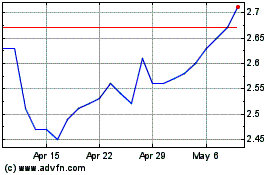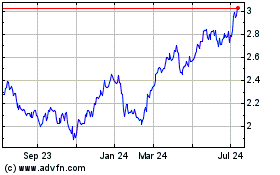Bank of England: All Seven Large UK Banks Pass Stress Tests
December 16 2019 - 12:53PM
Dow Jones News
By Paul Hannon
The U.K.'s banking system has enough high-quality capital to
withstand a crisis more severe than the one they faced in 2008 and
2009, the Bank of England said Monday.
Announcing the results of its annual stress tests, the BOE also
said that each of the seven banks that were scrutinized also
passed, although it said investors should note they did so only by
cutting their dividend and bonus payments.
The annual tests were introduced in the wake of the global
financial crisis, and are designed to find out whether banks have
enough capital to take large losses without cutting back on their
own lending. Banks that fail the test are required to add fresh
capital.
The seven banks tested were Barclays PLC (BARC.LN), HSBC
Holdings PLC (HSBA.LN), Lloyds Banking Group PLC (LLOY.LN),
Nationwide Building Society, Royal Bank of Scotland Group PLC
(RBS.LN), Santander U.K. Group Holdings PLC and Standard Chartered
PLC (STAN.LN).
"The U.K. banking system would be resilient to deep simultaneous
recessions in the U.K. and global economies, combined with large
falls in asset prices and...misconduct costs," the BOE said.
The BOE said that U.K. banks entered the stress tests with
common equity Tier 1 capital that was three times higher than
before the global crisis, at 14.5% of risk-weighted assets. Even
after the losses they faced under the stress scenarios, U.K. banks
still had twice as much such capital as they did before the crisis,
at 9.3% of risk-weighted assets.
The BOE said the stress tests also indicated that U.K. banks
could withstand a disorderly departure from the European Union, a
scenario that has become less likely since elections Thursday gave
U.K. Prime Minister Boris Johnson a large majority in
parliament.
The BOE's Financial Policy Committee also said it had "tweaked"
its capital requirements for U.K. banks. From late 2020, U.K. banks
will be required to have a countercyclical capital buffer
equivalent to 2% of their risk-weighted assets, up from 1% now.
The buffer is designed to build up capital during periods of
economic growth and expanding credit that can be drawn on during
downturns. The BOE said that if it were to cut the buffer to zero
from that level during a downturn, banks would be able to take
GBP23 billion in losses without having to restrict their
lending.
The BOE said it will also "consult" on an offsetting reduction
in minimum capital requirements for banks, leaving their combined
loss-absorbing capacity "broadly unchanged."
Write to Paul Hannon at paul.hannon@wsj.com
(END) Dow Jones Newswires
December 16, 2019 12:38 ET (17:38 GMT)
Copyright (c) 2019 Dow Jones & Company, Inc.
Lloyds Banking (NYSE:LYG)
Historical Stock Chart
From Mar 2024 to Apr 2024

Lloyds Banking (NYSE:LYG)
Historical Stock Chart
From Apr 2023 to Apr 2024
